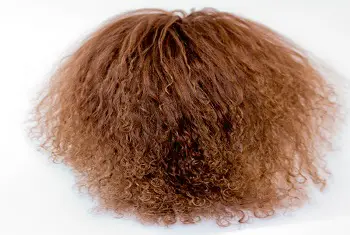Many people talk about how soft water has a smooth and slippery feel to it, but I also get people that are used to soft water ask me how they can tell if the water is hard, just by the feel of it.
What does hard water feel like? Hard water contains minerals that will cause friction between the surface of one area of skin and another. After bathing in hard water, the dirt and grime that have been cleaned away can be replaced with deposits of hard minerals and soap scum that will leave your skin feeling dry and rough.
Hard water on your skin will feel very much like your skin before bathing.
When your skin has a build-up of dirt and dust mixed in with the oils in your skin it will feel rough.
When you use hard water and soap to clean your skin, hardness in the water inhibits the ability of soap to remove the dirt and grime that is on your skin.
Since the dirt and grime that is already on your skin has minerals in it, the minerals in the hard water will make it difficult for the soap to remove the minerals from your skin, and therefore not be able to leave your skin free of mineral deposits.
In a sense, you will just be replacing deposits of dirty minerals with deposits of clean ones.
Just think about when you’ve been outside for several hours on a warm and dry summer day. And the wind is swirling dust into the air, leaving a thin layer of dust on your skin.
It feels dry and itchy, right. Well, that is the same reason that it can feel dry and itchy after washing in hard water.
How can your skin feel dirty when it’s clean?
Of course, your skin will feel dirty when there is a layer of dirt on it. This is very much the same as after you have bathed in hard water.
When you apply soap to your skin with hard water, the soap molecules will bond with the hardness that is suspended in the water to create a gooey type of paste that is called a curd.
Kind of like cottage cheese, but gooier, with a waxy, feel when it dries. The same stuff that creates that yucky soap ring around the tub after bathing with soap in hard water.
This curd will settle into the pores of your skin and not rinse off easily. Even after drying your skin, this curd can remain on your skin and give it a rough and dirty feel.
Don’t believe everything you hear about what is considered clean!
If you are familiar with the phrase “squeaky clean”, then you know what hard water sounds like.
Yes, that old phrase that used to be used as a selling tool to make us buy certain soaps and cleaners actually refers to the sound of hard water and soap scum leftover on your skin after bathing in hard water.
The reality of it is that squeaky sound that you hear is the sound of your skin squashing over the soap curd and hardness residue that is stuck to your skin.
This “squeaky clean” caused by leftover soap and hardness residue is most noticeable on your hair.
Many shampoos will leave a very thick deposit of soap scum on the hair, leaving a layer over the entire strain of hair, making for a steady squeaking noise from the base of the hair right out to the very ends.
How hard does water have to be to irritate your skin?

Just slightly hard water (up to about 7 grains per gallon) will leave your skin feeling a bit rough and dry after washing in it, but when bathing in water that has a significant hardness in it ( 15 grains per gallon and up), your skin can feel downright irritated.
Many people that have very hard water complain about redness and patchy dry skin problems that don’t seem to want to go away, even with regular use of creams or medicated powders.
This is because the hard minerals left on the skin after bathing make the skin less able to hydrate itself, in other words, dry skin.
Will hard water ruin your hair?

Hard water will leave your hair limp and lifeless. Your hair will have very little bounce or body. Split ends occur far more often when bathing in hard water. And symptoms like dandruff and a very itchy scalp are very common complaints from washing your hair in hard water.
Women often complain about discoloration in their hair after washing their hair in hard water shortly after having their hair treated or dyed. I myself have seen woman’s hair become orange and even a pretty teal green color (although they did not think it was very pretty) due to hardness in their water.
I have heard that regular washing of your hair in hard water can cause it to even fall out, but I believe that it has more to do with how the hard water affects the person’s scalp rather than what it does to the person’s hair.
What will hard water do to your fingernails?
Finger and toenails can become discolored from the dirt deposits left behind under the nail after washing in hard water because the sticky curd can settle deep down between the nail and skin. They can also become more brittle from hard water, making them crack and chip more easily.
Is hard water safe for my pet’s skin?
Although I am not a pet owner myself, I understand that bathing pets with lots of thick and long hair in hard water can be a nightmare because the hard water curd deposits left on the animal’s fur make it stick together creating an endless amount of knots. This makes grooming your pet much more of a challenge and the pet also suffers from itchy dry skin all over its body. Poor thing.
How hard water feels compared to soft water.
Probably the best way to understand what hard water feels like is to understand what soft water feels like. Some people refer to the feeling of soft water as being a slimy feeling between one piece of skin and another. But I prefer to use the term silky.
When your skin is truly clean and free of deposits there will be nothing between the two pieces of skin except water. Now we all know that oil and water do not mix, this is exactly what is happening when you feel that slick, silky feeling between your fingers with soft water.
Since there is nothing in the water to cause any kind of resistance, the skin containing oil will slide smoothly over the thin layer of water between the two layers of skin.
If your water has been feeling a bit different lately, and you think that your water softener is not working correctly, see my articles about Water Softener FAQs to help determine what may be the cause.
Related questions:
Why does my shower water feel sticky? Chances are, it is not the water at all. More than likely it is the feeling of hard water minerals that have bonded with the soap that you just used and has created a film of sticky curd that is now on your skin.
This curd gets stuck in your pores and prevents the oils in your skin from getting out. This can lead to breakouts and skin irritation.
Why does it feel like soap doesn’t rinse off with soft water? This is because soft water does allow all the soap to rinse away. The slippery feeling that you get after bathing in soft water is the oils in your skin sliding over each other instead of soap scum that is left over after bathing in hard water.


My well water goes thru a softner, 3 stage filter and a sulfer filter, but sometimes, when i shower, the water feels sticky, until it dries. This is a new situation after a year with a new house. Any ideas?
Hello Debra, and thank you for the question.
It sounds like you are running out of soft water. The sticky feeling that you are getting is most likely from soap curd build-up on your skin because of hard water. If this seems to happen every few days, make sure that your water softener is set correctly for the hardness in your water. If you don’t know your water hardness, get a WATER HARDNESS TEST KIT and make sure your water softener is set correctly. I often add about 10% to the hardness setting to allow for any change in water hardness.
If this stickiness started overnight and you receive your water from a municipal water source, your water may have changed. If they have done work on the pipes, I have heard of water-soluble flux which is used to attach plumbing together getting into people’s water and giving the water a temporary waxy feeling.
But I suspect that you running out of soft water because your water softener is not set correctly. Test your water hardness with a WATER HARDNESS TEST KIT to determine your water hardness, and set your water softener correctly, check that your water softeners clock is set for the correct time of day.
Check that your 3 stage filters are not clogged, and make sure that your water softener is not operating at the same time as your sulfur system. This can cause the water softener to not get enough water to work properly.
If you find that you still get hard water after that, see my article I HEAR MY WATER SOFTENER WORKING, BUT I STILL HAVE HARD WATER?
I hope this was helpful.
Paul